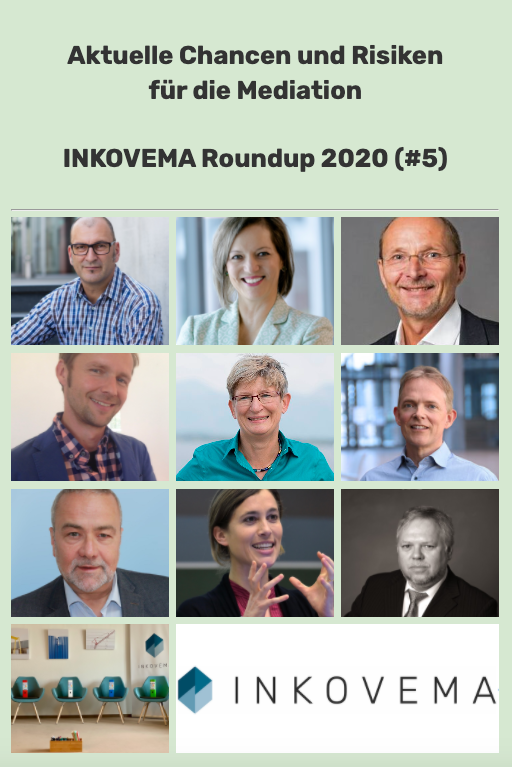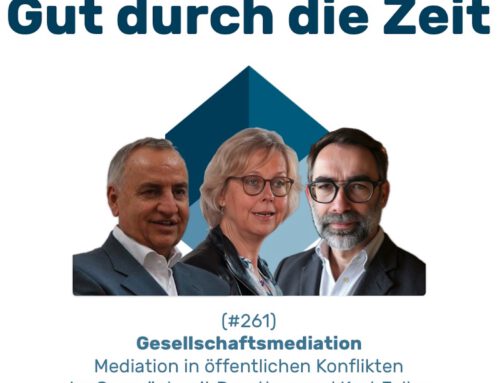Current opportunities and risks
for mediation
INKOVEMA Roundup 2020 (#5)
In March 2020, we at INKOVEMA set about preparing our annual roundup post, which was due to be published in the spring. …and then came Corona. The virus galloped through the world, reached Germany, caused economic cycles to freeze, left children, schoolchildren and employees largely confined to their own four walls and Zoom, and brought public life to a standstill. Some found time for private construction projects, others rebuilt their companies. A few started to make a mess. And mediators found themselves in a new world of conflict.
After a – largely – calm, sunny summer in Germany, which allowed us to put our thoughts in order but did not allow the economy and society to blossom, the virus is once again threatening to set the pace for family, economic and social conflict. That is why we have now made up for what we were unable to do in the spring. We have once again interviewed various mediation experts (20 in total, 12 men, 8 women): Where are – the opportunities for mediation, where are the risks? What is – for mediators – to do?
You can find your answers here.
I wish you, dear reader, much joy and realisation. Stay healthy and – get through this time well!
Original enquiry:
Looking at the current social crisis situation in Germany and Europe (health crisis, economic crisis and possible democratic crisis):
1. what are the current opportunities and risks for mediation and mediators?
2 In view of this situation, what specific recommendations can you make to the mediation scene and mediators?
1st Prof Dr Nadja Alexander
Singapore
Professor of Law (Practice),
Director of SIDRA,
Singapore International Dispute
Resolution Academy
Website:
sidra.smu.edu.sg

The current crises are an opportunity for creativity and innovation. Why?
Caught in this ongoing state of uncertainty, we are called to rethink many things – how we work, how we socialise, how we travel and how we live as family units. We are also called to reimagine how we deal with conflict – from the kitchen table to the boardroom table.
The new Singapore Convention on Mediation has put international mediation centre stage by creating a framework for the direct enforceability of mediation agreements. Furthermore, mediation has become a seemingly pandemic-proof dispute resolution mechanism. It is procedurally agile and can deliver timely and commercially viable solutions that are necessary to weather the global economic downturn.
How can mediators be innovative?
1. mediators can use technology in 1000 different ways. The 2020 SIDRA survey report shows that half of clients using mediation rate platforms for conducting virtual/online hearings as „extremely useful“ or „useful“. Similar results were reported in relation to e-discovery/due diligence tools, negotiation support tools and mediator and/or advisor appointment analyses. Given the global pandemic, the percentage is now likely to be much higher, presenting an excellent opportunity for mediators.
2. mediators can be creative in working with other dispute resolution professionals (e.g. arbitrators) to design procedures using a combination of different methods to achieve the best conditions for the enforceability of dispute resolution outcomes and for the preservation of business relationships.
3. mediators can develop services as deal brokers to help clients renegotiate agreements that are no longer beneficial to both parties in light of the health crisis.
4. the risk for mediators will be to wait for the „new normality“ instead of helping to shape it.
My recommendations
2. Robert Erkan
Hanau
Mediator (BM),
systemic business coach (ILP),
Communication trainer
Website:
www.erkan-communication.de
www.systemischeallianz.de

Mediation is more than just a process.
Crisis is always an opportunity. Naturally, in crises we are confronted with "fear" in the truest sense of the word - especially and intensely right now.
"Preserving" in the sense of "returning" to normality is not possible; this is becoming clear. The challenge is to find an as yet unknown - also transformed - new normality after the crisis - also taking fear into account.
This strong "field of fear" surrounds us, including us mediators, including me. It is therefore important to look inwards, starting with ourselves - to meet and feel ourselves constructively, humanly, forgivingly, graciously and lovingly (again or again and again) in order to then be able to work outwards in a positive, creative, courageous, authentic and empathetic way.
For mediators, for example, this means that defensive reactions (such as destructive boundaries, "disobedience", blame, exercise of power, any projections such as anger or hatred) are strategies and attempts at self-protection, also within ourselves, which need to be recognised when we observe them.
Clarification and clarity are inherent in the unpleasant and painful. In doing so, we only go out through it, which is both painful and healing at the same time.
With the courage to recognise, acknowledge (and let go of), dealing with one's own "field of fear", new adequate, humane and cooperative fields are created. It also involves being in a relationship and maintaining it in dignity and peace. And who has the best prerequisites if not the mediator themselves? Adopting this attitude more clearly helps to remain clearer in the process/interaction. Therein lies the greatest opportunity.
Being a mediator is an attitude, more than just understanding mediation as a process. My outlook is that new doors will open, including unthinkable fields of work and forms of activity - whether in the digital or analogue world. Especially in times of crisis such as these, a kind of renaissance of "mediation" could develop in society, which could be more widely recognised. Ultimately, this requires an inner decision of will and conviction, coupled with the power of the collective in cooperation, also among us colleagues.
Václav Havel aptly said: "Hope is not the conviction that something will turn out well, but the certainty that something makes sense, regardless of how it turns out."
3 Christian Hartwig
Magdeburg
Mediator (BM),
Mediation trainer (BM),
Transformative Mediator (ISCT),
Lecturer at the HU Berlin
Website:
www.christianhartwig.de

What are the current opportunities and risks for mediation and mediators?
Even before the coronavirus crisis, it was clear that we are living in a very conflict-ridden time. Opposites and differences of opinion are clashing ever more fiercely and dividing people in many areas of life, making dialogue difficult or even impossible. Fortunately, mediation is now recognised as an instrument for conflict resolution. It therefore opens up the prospect of describing a new vision of social interaction.
However, professional mediation is predominantly conceptualised as a means of helping disputants to satisfy all interests and needs affected by the conflict and to reduce the suffering of the parties in disputes. Of course, this can be explained by the history of its origins, as the concept is based on an individualistic world view. The conflict is thus redefined as a joint problem, with mediation forcing a joint, integrative solution to the problem. Recommendations for mediators are based on finding ways in which parties can satisfy their individual needs – the so-called win-win solution. Thus, the view still prevails that mediators should take responsibility for steering the process to help the conflict parties to engage in a collaborative process as they need help in solving their problems. This way of thinking tends to be reinforced by the constant legalisation resulting from the requirements of the Mediation Act and the associated standardisation of the practice and training landscape.
The relational view is different: It sees people as autonomous beings who are at the same time fundamentally interconnected. Human growth and learning take place when people try to harmonise their own autonomy with maintaining positive relationships with others. Conflicts in particular enable people to optimise this balance and gain new insights as a result. The CPs learn and experience how to deal with situations in which someone else's point of view differs from their own. As a result, the parties gain self-confidence and the ability to make decisions so that they can achieve what they want based on the changed interaction. In the transformative orientation, conflict is the driving force in a process through which people can gain self-confidence and refine their identity through involvement in enduring social relationships, institutions and ideologies.
In view of this situation, what specific recommendations can you make to the mediation scene and mediators?
To be of proper help to the parties in conflict, mediators should understand what the conflict means to the parties and what they find difficult in their current situation. Mediators should understand what the CP is going through from their point of view. It is a time of change for each and every one of us. We know that. We as mediators can contribute to this by supporting the people who come to us in their efforts to understand their own situation as well as that of the other CP – if they so wish!
Rather than focusing on persuading parties to resolve a problem, mediators should train themselves to follow the disputants in dialogue in order to find self-determined ways to overcome their bitter experiences of conflict and move on. By maintaining this focus on conflict transformation in their work, mediators can help disputants find a balance between their own strength and their relationship with others.
Which topics the CPs wish to discuss and how they wish to organise these discussions should be their sole responsibility, whereby mediators ensure that the parties are able to assume this responsibility.
Christian Hartwig's comments, abridged here, will soon be published in a detailed guest article here in this blog.
4 Uwe Kassing
Hamburg, Leipzig
Legal scholar, Ass. jur,
Additional qualifications:
Specialist lawyer for insolvency law (DAA),
Certified mediator (DAA)
Reorganisation mediation,
Certified ESUG consultant (D.I.A.I.)

What are the current opportunities and risks for mediation and mediators?
Against the current background – crisis situation economic crisis and COVID-19 epidemic in Germany – there are particularly strong effects on the economy. It is clear to me that this economic crisis is also generating and will continue to generate an above-average potential for conflict. Mediators will therefore be in demand in the field of business mediation to support conflict resolution.
The press reports on the negative economic impact of the COVID-19 pandemic on the German economy agree that this unprecedented recession in gross domestic product has led and will lead to a sharp increase in business crises.
This is the starting point for a sensible "Mediation in the corporate crisis". A corporate crisis contains a "bouquet" of potential conflicts that are amenable to mediation. Ailing companies should use the delay to attempt a reorganisation with the help of a mediator.
To support pre-insolvency reorganisation, the new EU directive also provides for the involvement of a mediator and special rights for the company concerned to involve only certain creditors in the reorganisation measures. This can also include a Extrajudicial restructuring moratorium be agreed. In this phase, it is particularly important to use mediation with a specific communication concept to bring the parties to the conflict to the negotiating table. This is where mediation has proven its worth.
The risks of a Mediation in a corporate crisis For the mediators, this means keeping a constant eye on the framework conditions under company law, insolvency law and criminal law during the mediation process. This is because the agreement of a restructuring moratorium alone does not guarantee that mutual claims by the parties involved will not lead to undesirable side effects if the mediation fails at a later date.
In view of this situation, what specific recommendations can you make to the mediation scene and mediators?
The challenge for mediators is first of all to compare the current situation with their own possibilities and competences, to sharpen their own profile with regard to the possible applications (areas of conflict) and, if necessary, to carry out a (regional) market analysis to determine whether and to what extent support for business mediation, especially in the case of a conflict, is necessary. Mediation in the corporate crisis, can actually be achieved.
Selective mediative support, e.g. in internal labour law conflicts or conflicts within supply or customer relationships that stand in the way of an overall solution to overcome a corporate crisis, can also be very helpful.
Particular attention should also be paid to the drafting of contracts and liability regulations for mediators, as this is generally an area of mediation that is fraught with liability.
Mr Kassing's comments, abridged here, will soon be published in a detailed guest article here on this blog.
5 Anja Köstler
Munich
Mediator BM and BMWA,
Trainer Mediation BM/
Teaching trainer BMWA,
Organisational and management developer
Trainer for Mindful Leadership
Website:

What are the current opportunities and risks for mediation and mediators?
Under the current pressure, everything that is not immediately considered vital is being relegated to second, third and fourth place. In companies as well as in politics and the healthcare sector.
I see two dangers:
- Organisations are cutting many of the communicative, development-oriented formats such as team development, training, HR budgets, etc. in order to save money.
- Conflicts that point to complex dysfunctionalities or deficiencies and thus hinder significant further developments are being overlooked even more than before.
"Where danger grows, the saving grows too." (Hölderlin)
When economic survival is in question, creativity and innovation are required – in a highly stressful and pressurised situation. This makes it all the more essential for companies and organisations to rely on the potential of their employees. This requires actively and consciously eliminating the burden of conflicts, which usually intensify during the crisis(es). This is the only way to free up thinking and creativity and to develop the necessary self-organisation and self-management skills.
Mediation can remove these obstacles more quickly and in a more targeted manner than low-threshold programmes such as team development or training. There will be resources available for mediation.
The complexity of crises is high: what helps on one side raises new problems elsewhere. There is no single logic that solves everything. Trying to manage complexity simply creates high risks for the system as a whole, – as can be seen from the social conflicts we are currently experiencing. The ways in which conflicts are being resolved are coming to a head and, at the same time, the "scenes" are increasingly separating from one another.
The process of mediation, recognising the different interests, bringing them into contact and weighing them up and reaching a balance of interests, becomes all the more important.
The shift of communication to the virtual world has initially pulled the rug out from under the feet of some mediators. However, virtual meetings also have a relieving function for the conflict parties. Conflicts can be addressed and dealt with without having to sit in the same room as the other party. This creates protective spaces that are not equally available in face-to-face mediation.
In view of this situation, what specific recommendations can you make to the mediation scene and mediators?
Get in touch, make your competences and the benefits of mediation visible.
Actively place yourself in the "in-between" of parties and make it tangible that you can endure this and will increasingly have to in future.
Make solidarity offers to your customers. In these times, linking your own self-worth to the amount of your fee is of no use to anyone.
Learn to work online. This includes being able to assess how I can create focus, closeness, distance, self-clarification and understanding in virtual meetings – and in which case constellations and degrees of escalation.
Resist the temptation to accept online jobs that require presence.
Deal with complexity, because the real challenges are not the linear processes that quickly become apparent, but dealing with contradictions and with "perceived" truths and facts.
6 Dr Hanna Milling
Berlin
Peace & conflict researcher,
Mediator & Trainer BM,
Trauma therapist
Website:
www.hannamilling.de

What are the current opportunities and risks for mediation and mediators?
We are experiencing a huge polarisation of society in the face of the coronavirus crisis. Very different political camps are suddenly speaking similar languages and friends, families and neighbours no longer understand each other, accuse each other and point fingers at each other. The common denominator: fear. Existential fear. Fear of illness and death, fear of loss of freedom and abuse of power, fear of poverty and unemployment. The attitude of mediation, which does not allow itself to be drawn into any polarisation, but remains in the mutual desire to understand and feel, takes ALL fears seriously and wants to listen to them instead of condemning them, is more important than ever. I believe that our opportunity in this time of crisis is to bring the attitude of mediation to all areas of life and to the public and thus make an immeasurable contribution to turning the crisis into an opportunity. The risk: Drawing ourselves into fear and letting it guide us.
In view of this situation, what specific recommendations can you make to the mediation scene and mediators?
7 Dr Jürgen von Oertzen
Karlsruhe
Doctorate in political science,
Certified mediator,
M.A. Mediation
Website:
www.einigungshilfe.de

What are the current opportunities and risks for mediation and mediators?
Even before the coronavirus crisis, there was a great need for humanistic conflict resolution in business, society and families, but only a small proportion of this demand actually materialised in the form of mediation. As far as I can see, this is being exacerbated by the coronavirus crisis: family problems, including domestic violence and femicide, are likely to increase, teams are finding themselves in unfamiliar, conflict-prone situations due to working from home and working remotely and at different times, and society as a whole is having to withstand more centrifugal forces than before. Mediation or a mediative approach would be just right for all of this: clarifying misunderstandings, accepting and understanding different opinions and needs, and arriving at solutions on a mutually accepted factual basis that enable people to live or work together in a truly human way. Unfortunately, however, the gap between need and demand has widened: The risk of contagion can deter people (or serve as a justification) for not wanting to go to mediation. Many companies (justifiably) fear for their previous profit margins, sales and familiar business processes, so that executives and managers have even less time and leisure than usual to invest in the - ultimately more efficient - approach of mediation.
In view of this situation, what specific recommendations can you make to the mediation scene and mediators?
8 Thomas Robrecht
Nuremberg
Managing Partner
from SOKRATeam,
Leadership developer,
Trainer and book author,
Mediator and trainer (BM)
Website:
www.profimediation.info

What are the current opportunities and risks for mediation and mediators?
Corona is polarising. This could be an opportunity for mediation. Conspiracy theories are becoming increasingly popular. Facts are fake and someone else is to blame. This attitude removes personal responsibility, stigmatises and makes mediation seemingly obsolete. The only people who know better are the mediators. And yet the mediator's lack of personal responsibility makes it very difficult or even impossible to develop needs-based solutions in mediation. This was already the case before coronavirus. Corona has made it clear that focussing on individual needs is not enough, because collective needs are at least as important - if not more so.
Mediation works with collectives. It is therefore obvious to utilise the requirements of the collective as the basis for mediation. This frees it from the condition of individual responsibility. The opportunity lies in broadening the understanding of mediation and defining it as "enabling a collective to find a solution". The two process logics (needs- and outcome-focussed) are described in more detail here: https://youtu.be/nTWo23-0zno
In view of this situation, what specific recommendations can you make to the mediation scene and mediators?
Firstly, every mediator should check for themselves whether they are comfortable with outcome-focussed interventions, as this form calls into question the mediative principles of needs-focussed work. Voluntariness and confidentiality can also be used to disguise a lack of willingness to take personal responsibility. This allows individuals to harm a collective without being held accountable. This possibility does not exist with outcome-focussed interventions because they make a lack of willingness visible and discussable for the collective. This video explains exactly how outcome-focussed mediation is implemented: https://youtu.be/NLDRwbe3XF8
The more mediators who embrace this form of mediation, the greater the chances of using mediation to find solutions even if the mediands are not open-minded. This allows a bridge to be built between people with different levels of willingness. The only prerequisite is that there is a goal that is accepted by all parties involved.
9 Klaus-Olaf Zehle
Hamburg/Lübeck
Mediation in shareholder conflicts &
in the event of internal disputes,
Graduate industrial engineer,
Certified mediator M.A.,
Business Lawyer LL.M. (com)
Website:
www.klausolafzehle.de

What are the current opportunities and risks for mediation and mediators?
Corona and its effects have made it clear that digitalisation does not stop at mediation. What do I make of this?
The number of training courses and training modules on online mediation has risen sharply during the lockdown. I have personally been able to take advantage of various opportunities. At international level, for example, through CPR, a four-hour event with over 60 participants, or a very good two-day module at Viadrina.
Since July of this year, online platforms such as E-Bay, Amazon, Google and many more have had a guideline for resolving disputes with merchants who use their platform, the so-called P2B guideline. The platforms in particular have a strong interest in digital models and have concluded fixed agreements with mediation providers who offer online mediation.
After we have published on our portal www.mediator-finden.de have expanded the possibilities of offering online mediation as a procedural model, the number of mediators offering this service has risen from just over ten to around 150 mediators within a few weeks
What do I deduce? The number of mediation cases will increase, partly due to framework conditions such as the P2B Directive and the possibility of lowering the entry threshold for mediation proceedings by reducing the amount of travelling required. Now that the lockdown is over, the temporary restriction on face-to-face mediation has been reduced. Mediation can therefore benefit overall.
In view of this situation, what specific recommendations can you make to the mediation scene and mediators?
I recommend that every mediator familiarise themselves with online procedures and their special features. The data protection and confidentiality problems initially associated with the Zoom platform in particular have now been overcome. The various platforms offer a wide range of possibilities, from the very easy-to-use Google Meet to Webex, Zoom, MSTeams or Skype to special platforms such as Vitero, there are many variants and functions available. Mediators working in a corporate environment are usually forced to use the platform used by the company. Those working in a private environment should use the tool of their choice.
Mediators can only overcome the scepticism they often feel by trying things out. The ability to utilise online and face-to-face formats within a process will increase client acceptance and the benefits of mediation.





Leave A Comment